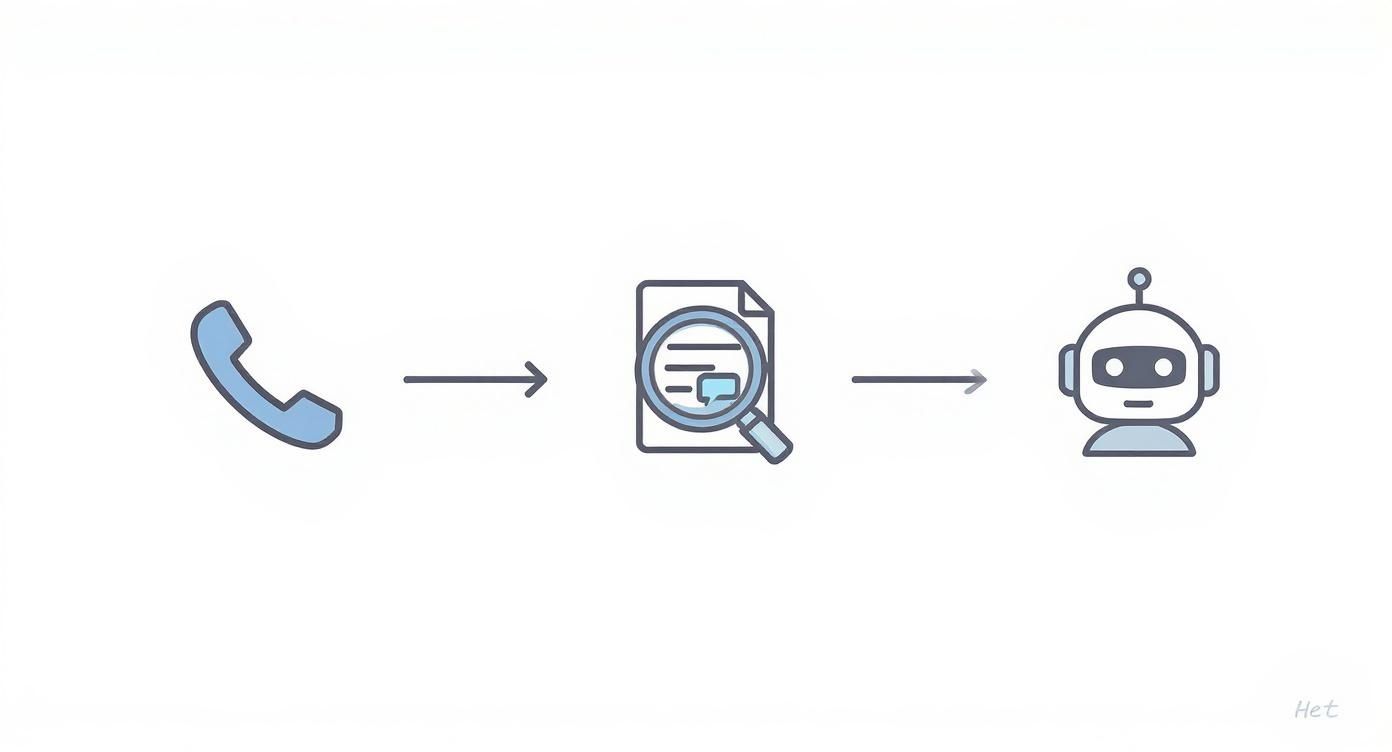In Australia’s fiercely competitive real estate market, staying ahead of the game is everything. Traditional lead generation is starting to feel a bit like trying to catch rain in a thimble – agents are swamped with leads from portals, and the pressure to respond instantly is immense.
Let's be honest, every missed call or delayed follow-up is a potential listing handed straight to a competitor.
This is where AI-powered outbound calls are changing the game. Instead of you or your team being chained to the phone, manually dialling and leaving endless voicemails, you can deploy intelligent systems to handle that first, crucial outreach.
It’s a massive shift from manual grind to smart, automated engagement. The result? Your team is freed up to focus on what they do best: high-value interactions and closing deals. It’s a genuine advantage in a very crowded market.
Why AI Calling Is a Game Changer
This technology isn't here to replace agents; it's here to empower them. By automating the top of the funnel, you guarantee every single lead gets a prompt, professional touchpoint, no matter when they enquire.
Think about the immediate wins:
- 24/7 Lead Engagement: An AI caller is always on. When a hot lead submits an enquiry at 10 PM on a Saturday, they get an immediate, natural-sounding follow-up call. No more waiting until Monday morning.
- Unmatched Precision: You can program the AI to ask specific qualifying questions, sorting the genuine prospects from the tyre-kickers with incredible accuracy.
- Scalable Outreach: Need to contact hundreds or even thousands of leads in your database? No problem. You can do it without burning out your team or needing to hire more staff.
In Australia's real estate sector, where over 145,000 professionals are all chasing the same leads, tools like this are quickly becoming a strategic necessity, not just a nice-to-have.
The early adopters are already seeing massive benefits. They've found that AI-qualified leads are up to 70% more likely to convert, which translates directly into more listings and quicker sales.
The core advantage is simple: AI handles the repetitive, low-return work, allowing your agents to focus their energy on building relationships with warm, qualified prospects who are ready to talk business.
This guide is your practical roadmap to making this shift. If you're new to the whole idea, our article on the fundamentals of AI phone calls is a great place to get up to speed. To see how this fits into a broader strategy, you can also explore this guide on AI powered lead generation.
We’ll walk you through everything—from planning and scripting to launching and optimising your campaigns—to give you a powerful new edge.
Building Your AI Campaign Foundation
Diving into AI-powered outbound calls for real estate lead generation without a plan is a bit like building a house with no blueprints. It’s a recipe for disaster. Before your AI makes a single call, you need to lay a solid foundation. This is where you turn a powerful tool into a strategic, money-making asset.
It all kicks off with setting crystal-clear campaign goals. What are you actually trying to achieve? Just "getting more leads" is way too vague and won't get you anywhere fast.
You need specific, measurable objectives. Things like:
- Book 15 qualified seller appraisals in the next 30 days.
- Qualify 50 new buyer leads who just enquired on the portals.
- Re-engage 100 past clients from your database to see where they're at.
Having a precise target like this shapes every single decision you make from here on out, from the scripts you write to the leads you target.
Segmenting Your Database for Maximum Impact
Think of your database as a goldmine. But not all the gold is in the same spot. Blasting the same message to every single contact is a surefire way to waste time, annoy people, and get terrible results. This is where segmentation comes in. You need to slice up your contacts into distinct groups based on what they have in common.
It’s just common sense, really. A cold lead who downloaded a generic suburb report needs a completely different conversation than a warm lead who just hit "request valuation" on your website.
Key Takeaway: When you get segmentation right, your contact rates can shoot up. Why? Because the message is relevant from the very first second. You’re not just making a random call; you’re continuing a conversation that, in a way, has already started.
Integrating Your Tech Stack
For an AI caller to really work its magic, it can’t be off on its own island. It needs to talk to your other systems. Seamless integration with your Customer Relationship Management (CRM) system isn't just a nice-to-have, it's non-negotiable.
This connection makes sure that every call outcome, every note, and every appointment gets automatically logged against the right contact. No more manual data entry.
This simple link-up cuts out human error and gives your agents a complete, real-time picture of every lead’s journey. AI-powered outbound calls are a potent form of marketing automation. To get the most out of them, it’s worth exploring the best marketing automation software platforms that can plug in and boost your AI calling efforts.
The infographic below really nails the shift from the old, manual way of doing things to a smarter, AI-driven approach for managing real estate leads.

As you can see, the AI jumps in to solve that age-old problem of slow or non-existent follow-up, giving you an instant, scalable solution. With that, your pre-flight checklist is complete.
Crafting AI Call Scripts That Actually Convert

Let's get one thing straight: your AI is only as good as the script you give it. You can have the most advanced tech in the world, but if the script is clunky and robotic, you'll get nowhere fast. This is where your strategic AI powered outbound calls for real estate lead generation campaign really comes to life.
The goal here isn't to create a robot that just reads a monologue. You’re designing a natural, two-way conversation that steers a prospect toward a clear next step. It all starts with a compelling opening that doesn't immediately scream "sales call."
Forget those tired, generic openers. You need to lead with context. For a lead who just requested a property valuation online, the AI could kick things off with something like, "Hi [Name], I'm calling from [Agency Name]. You recently requested a valuation for your property at [Address], and I wanted to make sure you got it and see if you had any initial questions."
See the difference? It's direct, relevant, and immediately connects your call to an action they just took.
The Anatomy of a Winning AI Script
A solid AI script is built in layers. It needs a strong value proposition, smart questions, and the flexibility to adapt on the fly. Think of it less as a rigid text and more like a dynamic conversation map.
Your script has to quickly answer the prospect's unspoken question: "What's in it for me?" Get straight to the point. For instance, the AI could say, "Our aim is to give you a clear picture of what your property is worth in today's fast-moving market, so you can make a properly informed decision."
Next, you need to weave in smart qualifying questions that feel conversational, not like an interrogation.
- "Have you had any thoughts about when you might be looking to sell?"
- "What are the most important things for you when choosing an agent?"
- "Are you planning on buying another property in the local area?"
These questions gather crucial data for your CRM while keeping the prospect engaged. While you're putting your script together, it helps to lean on proven frameworks. For a bit more inspiration, check out our detailed guide on effective real estate cold calling scripts. The core principles there can be easily adapted for your AI.
Programming for Objections
Even the sharpest scripts will run into hesitation. The real magic of a sophisticated AI caller is its ability to handle common objections without missing a beat. You need to program it with pre-defined pathways for navigating that kind of pushback.
For example, if a prospect says, "I'm not ready to sell just yet," a basic AI might just hit a wall. A well-programmed one, however, can pivot smoothly.
AI Response: "That's perfectly fine. A lot of homeowners we speak with are just exploring their options at this stage. Would it be helpful if I sent you our latest suburb report? That way, you can keep an eye on local market trends."
This response validates their position, offers value without any pressure, and keeps your agency top-of-mind. It turns a potential dead end into a long-term nurturing opportunity—one of the biggest advantages of using AI for consistent, patient follow-up.
AI Scripting Framework for Different Lead Types
Not all leads are created equal, and your AI's script shouldn't treat them that way. A cold lead needs a completely different approach to a hot lead who's ready to sign on the dotted line. Here’s a quick breakdown to help you tailor your scripts.
| Lead Type | Opening Hook Example | Key Qualification Question | Primary Call-to-Action |
|---|---|---|---|
| Cold | "Hi [Name], this is [AI Name] from [Agency]. We've just sold a property down the road and are seeing huge buyer demand in your area. Have you considered what your home might be worth?" | "Are you the current owner of the property at [Address]?" | "Would you be open to receiving a no-obligation digital market appraisal?" |
| Warm | "Hi [Name], you recently downloaded our guide to selling in [Suburb]. I'm just calling to make sure you received it and see if you had any questions." | "What prompted you to look into the selling process at this time?" | "Would you be free for a quick 10-minute chat with one of our local specialists next week?" |
| Hot | "Hi [Name], you just requested a property valuation on our website for [Address]. I've got that ready for you now—is this a good time to quickly run through it?" | "Are you interviewing other agents for the sale of your property?" | "When would be the best time for our senior agent to pop by and finalise the appraisal?" |
Using a framework like this ensures your AI is always having the most relevant conversation possible. It personalises the approach, builds rapport faster, and ultimately drives much better results from your campaigns.
Launching and Monitoring Your AI Outreach
Alright, your scripts are polished and your database is sorted. Now for the exciting part – going live. Launching your AI-powered outbound calls is where all the planning pays off, but hitting ‘start’ is just the beginning. The real magic happens when you get obsessive about tracking what works and, just as importantly, what falls flat.
This is the point where you shift from making educated guesses to making data-driven decisions. Instead of just rolling with a single script and hoping for the best, you’ve got a golden opportunity to experiment. Think of it as running a live test lab for your real estate lead generation.
The Power of A/B Testing
You should never assume your first idea is the best one. This is where A/B testing becomes your best mate. It's a straightforward concept: run two slightly different versions of your campaign at the same time to see which one gets better results.
You can test almost anything. For instance:
- Different Scripts: Pit a direct, value-driven script against a more conversational, rapport-building one. Which one gets more traction?
- AI Voices: Does a male or female voice get a better response from your target demographic? What about a different accent or tone?
- Call Timings: Does your AI get more homeowners on the line at 6 PM on a Tuesday or 11 AM on a Saturday? There's only one way to find out.
By splitting your contact list and running these variations, your AI platform's dashboard will quickly show you a clear winner. This isn’t about your gut feeling; it’s about letting the numbers tell you what actually resonates with potential clients.
The goal is constant iteration. A small tweak, like changing the opening line of a script, can dramatically increase your contact rate or the number of appointments booked. Never stop testing.
Tracking Key Performance Indicators
Think of your AI dashboard as your mission control. It's loaded with metrics, but you need to cut through the noise and focus on the Key Performance Indicators (KPIs) that directly impact your bottom line.
These are the numbers you should live and breathe:
- Contact Rate: What percentage of your calls are actually answered by a real person? If this number is low, it could point to problems with your data list or the times you’re dialling.
- Positive Conversation Rate: Of the people who do answer, how many get into a meaningful conversation? This KPI is a direct reflection of how well your script's opening hook is working.
- Appointment Booking Success: This is the big one. What percentage of those positive conversations lead to a booked appraisal or meeting? This tells you exactly how effective your AI's call-to-action is.
Getting a handle on this data allows you to diagnose problems and fine-tune your approach systematically. For a deeper dive into the mechanics, our guide on how to make automated phone calls offers extra technical context to help you get your setup just right. By keeping a close eye on these KPIs, you’ll turn your AI outreach from a simple tool into a highly-tuned lead generation engine.
Optimising and Scaling Your Success

Right, your first campaign is live and the leads are trickling in. Good start. But now the real work begins. This is the part where you go from just running AI powered outbound calls for real estate lead generation to building an unstoppable lead machine. The goal? Boost your efficiency and pour fuel on what’s already working.
It all starts with getting smarter about your lead scoring. By now, your AI has had hundreds of conversations, gathering priceless intel on what makes sellers tick—their motivations, timelines, and biggest headaches. This isn't just data; it's gold.
Forget basic scoring. You can now layer in real conversational intelligence. For example, a lead who drops the line "I'm interviewing a few other agents" during an AI call is instantly a red-hot priority. Compare that to someone who says they're "just curious about the market." This data-driven approach means your agents stop wasting time and focus only on the people most likely to sign on the dotted line.
Automating the Admin Burden
A truly scaled AI system does more than just find leads; it gets rid of the repetitive, soul-crushing admin that slows your team down. Think about all the little things your agents do that are essential but don't actually close deals.
Your AI can be set up to handle these jobs seamlessly, right in the middle of a conversation:
- Booking Appointments: When a lead is keen, the AI can tap into your agents' calendars, offer up available slots, and lock in a meeting on the spot. It'll even send the calendar invite.
- Managing Compliance: The system can automatically log every single call, record consent where needed, and keep a clean audit trail. Suddenly, compliance isn't such a headache.
- Sending Info: Prospect wants a suburb report or some recent sales comps? The AI can fire off an automated email with the documents before the call even ends.
This isn't just about making life easier. It's about freeing up your most valuable asset—your team's time—so they can focus on building relationships and closing deals.
Global studies suggest AI can save real estate professionals up to 16 hours a week with this kind of automation. But this is especially true here in Australia. Our market is competitive and our clients are tech-savvy. An automated outbound calling system, particularly when plugged directly into your CRM, becomes a powerful safety net, ensuring no lead ever gets forgotten. If you want to dig deeper into the local market, check out these insights on AI's impact on Australian real estate agencies.
Knowing When and How to Scale
Scaling isn't just about cranking up the call volume. That's a rookie mistake. Smart scaling is about looking at the data and making intelligent moves to expand your outreach. When you find a script that absolutely kills it or a demographic that's responding like crazy, that's your signal to double down.
You might scale by:
- Rolling out your top-performing script to a much larger chunk of your database.
- Upping the daily call limit for campaigns targeting postcodes that are proving to be hotbeds of activity.
- Creating specialised AI campaigns for different property types—say, one for apartments and another for family homes—based on what your initial results tell you.
This methodical approach to growth takes the guesswork out of it. It minimises risk, maximises your return, and turns your AI caller from a handy tool into the central engine driving your agency's growth.
Got Questions About AI Calls in Real Estate?
Thinking about bringing AI callers into your agency but have a few things you're still mulling over? You're not the only one. Jumping into any new tech, especially something that handles client communication, naturally comes with a bit of healthy skepticism.
Let's get straight into it and tackle some of the most common worries agents have.
A big one is always, "How will my clients react to an AI?" It's a fair question. The trick is to be upfront and set the right tone from the get-go. A well-designed system won't try to fool anyone; it'll introduce itself clearly and always give the person on the other end a simple way to chat with a human.
The point isn't to replace your team, but to give leads an immediate, helpful response. When someone gets a smart, prompt call back just moments after they enquire online, that efficiency usually wins them over pretty quickly.
How Does It Handle Compliance and Privacy?
In Australian real estate, data privacy and compliance aren't just important—they're everything. Any reputable AI platform is built from the ground up with this in mind. They stick to the rules of the Spam Act 2003 and the Do Not Call Register Act 2006, making sure your outreach is above board.
You'll find they usually have key compliance features baked right in:
- Automatic DNC List Scrubbing: Before a single number is dialled, the system checks it against the Do Not Call Register.
- Clear Identification: The AI has to say who it is and which agency it’s calling from, right at the start of the conversation.
- Secure Data Handling: All your client information is kept safe and sound with encryption, protecting those sensitive details.
These safeguards are there to protect your agency's good name and keep you well within the law, so you can have total peace of mind.
Just remember, the AI is a tool that follows the rules you give it. When you set it up correctly, you’re in complete control of compliance, just like you are with any of your human team members.
Is It Actually Effective in the Aussie Market?
The early results are looking really good. Pilot programs here in Australia are showing that AI-powered calls can hit initial contact rates similar to human agents, but they do it for a fraction of the cost and can work 24/7.
We're hearing from agencies that are making hundreds of outbound calls overnight, which means even those late-night web enquiries get an immediate response. It's a game-changer. If you want to dig deeper into this, there are some great insights on AI's role in Aussie real estate over at nucamp.co.
At the end of the day, using AI for outbound calls is about giving your team a boost, not replacing them. It takes care of that initial, often tedious, outreach, freeing up your agents to do what they're best at: building relationships and closing deals.
Ready to see how an AI Call Assistant can transform your lead follow-up? With OnSilent, you can ensure every lead gets an instant response, qualifying prospects around the clock so you only spend time on conversations that matter. Stop missing opportunities and start closing more deals. Learn more at https://onsilent.com.

